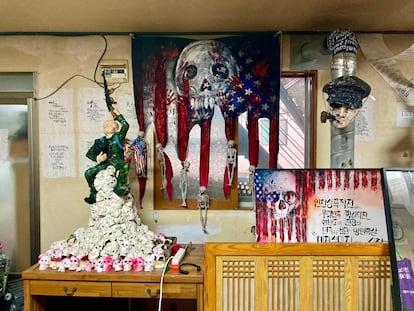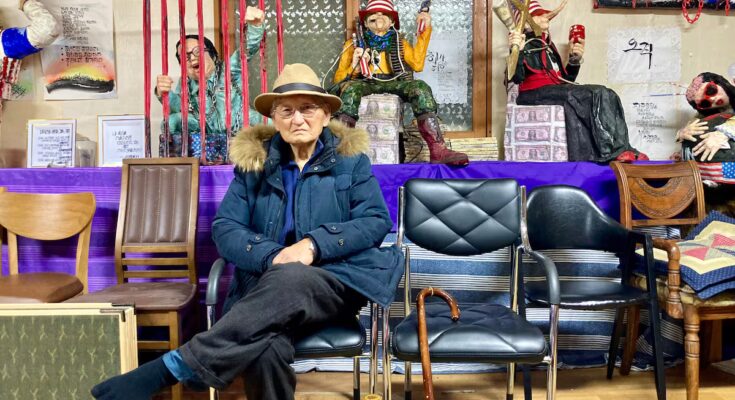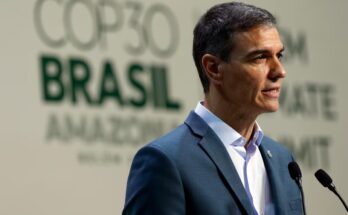—Why do you want to return to North Korea?
—It’s a long story. I have to tell you what has happened in these 70 years…
Ahn Hak-seop is a remnant of the Cold War. To know it, it is necessary to get to where the Cold War is still alive.
The fence crowns a cultivated landscape. “That’s North Korea over there,” says Pastor Lee Jeok, who is driving the car. Behind the fence topped with barbed wire are the anti-tank defenses located on the South Korean side of the Demilitarized Zone (DMZ), the border strip between the two Koreas; Then the leaden waters of the Han River open up. On the opposite bank you can see the blue hills of the most hermetic country in the world. Technically both sides are still at war.
Pastor Lee is the link to get to Ahn. I just crossed to checkpoint military to access this area under the control of the South Korean military, due to its proximity to the North. Here, in this small village of Gimpo, about 40 kilometers northeast of Seoul, is Pastor Lee’s parish, Mintongseong Peace Church. She professes the Christian faith, but when asked about it, she claims to be dedicated to the reunification of Korea and to carrying out anti-American activities. Regarding American President Donald Trump, who landed today, at the end of October, in South Korea, the pastor says: “It’s as if he had come to inspect a vassal state.” Yours is a strange parish. After driving along a tree-lined road, he stops the car in front of a house with an overgrown garden, where weeds climb everywhere, and a banner hangs next to the entrance: “Return immediately to the North Ahn Hak-seop, the world’s longest-serving prisoner of war, 42 years old.”
Once you cross the threshold, an American flag doormat awaits you, arranged so that it’s the first thing you step on when you enter. Inside, Ahn Hak-seop, a 95-year-old former communist soldier in the North Korean army, listens to a Soviet military march on his cellphone. A friend of the parish priest for years, he now lives in the parish, near the border.
Ahn rests his hands on a bucket and wears a felt hat. He was taken prisoner by the South in 1953. Convicted of espionage, he suffered brutal torture, but never signed a confession. He spent 42 years in prison and was one of the few to never change his ideology. His steady gaze denotes unyielding ideas: “People don’t realize that we are like slaves under the American colonial government,” he says of South Korea.
The South Korean press calls him an “unconverted long-time prisoner.” He is “one of six elderly former North Korean soldiers and spies who have not yet renounced their North Korea-related communist beliefs, despite spending decades in prison in the South.”
Now that his life is ending he wants to return. A group of activists supports their cause. He organized press conferences and demonstrations to ask the government to allow him to return. In the summer he tried to walk, with his slow old man’s pace, through Panmunjom, the border village where Trump and North Korean leader Kim Jong-un greeted each other in 2019. Ahn was arrested by the military before leaving South Korean soil. It is difficult to understand the reasons for his return to a place from which so many want to escape:
—I have to tell you what has happened in these 70 years…
Ahn was born in 1930, with Korea under Japanese rule, on Ganghwa, a border island a few kilometers from the parish, in what is now South Korea. No such division existed then and he identifies as North Korean. He was not even ten years old when the world was shaken by the Second World War; 15 when the war ended and the great powers that contributed to the liberation of Korea, the United States and the Soviet Union, discussed the fate of the peninsula. He says his anti-American sentiment began to form when U.S. General Douglas MacArthur announced the establishment of a military government south of the 38th parallel north, the gap that continues to separate the two countries today. “My political consciousness began to take shape.” Korea, he says, has gone from one colonial government to another.
Before the outbreak of the Korean War, he studied in Kaesong, then under the control of the South and now part of the North. There he joins the Communist Youth League and participates in clandestine activities to subvert the American presence. He has clashes with the police, spends his time hiding, lives “under bushes and pine trees”.
The start of the war, in 1950, surprised him at the age of 20. China comes to the aid of the North with millions of fighters, the USSR supplies weapons. The South, with the support of the United States, contains the lightning offensive. From the first year he remembers the Battle of Chosin. “There were many wounded Chinese volunteers, I helped with the transfers; at the end of 1950 I went to Seoul…” Close your eyes. Ask for a moment to think. He searches his memory, which seems to be made of fog.
Sometimes it’s difficult to follow the thread. The interview is carried out through an interpreter. Pastor Lee approaches and leaves some ginseng drinks on the table, with a metallic and sweet taste. Ahn finishes the bottle almost in one gulp.
In 1951 he formally joined the North Korean ranks as “the second platoon of Unit 941, directly subordinate to Army Unit 52,” he says glibly. It was a group of six men tasked with moving to the south, among enemy lines, to provide support to North Korean detachments. Its function is to bring supplies from the north. In April 1953, three months before the armistice, when his unit had been completely decimated and he was the only survivor, South Korean troops surprised him. “He was dressed in uniform,” he specifies. It is a relevant detail: despite this, he is accused of espionage and begins a carousel of brutal interrogations and torture that has lasted for decades. He underwent very harsh ideological conversion programs, through which prisoners were forced to renounce communist ideology.
“I fully met the criteria to be considered a prisoner of war under the Geneva Convention. As such, I should have been repatriated,” he protests. “This was a violation of international law and a crime committed by South Korea.” When questioned about the torture, he brings his chin closer to his hands resting on the stick and his voice breaks: “When I talk about it my heart beats hard and I can’t sleep.”
He talks about a frozen cell he entered barely sitting down; of arm dislocations until clicks were heard; of whippings with ropes full of knots; of simulated drownings; of their bare feet beaten with sticks until their nails were lost. He takes off his hat and points to the spot on the top of his head where they constantly poured ice water on him until he felt like he’d been hit by a rock: “It drove me to the brink of madness.” They encouraged him to sign a confession saying they could return to a normal life. He never accepted. The abuse lasted for years.
South Korea changed in the late 1980s. Democracy has arrived. Ahn Hak-seop was finally released in 1995, thanks to pressure from humanitarian groups. In 2004, a government committee reported the deaths of 77 detainees linked to the ideological conversion through torture program. Subsequently, according to a report by Ahn, another commission recognized Ahn as a victim of torture The New York Times.
He was freed at the age of 65, the Iron Curtain no longer existed and capitalism had transformed the country. At 70 he married a woman 32 years his junior. Today he suffers from dementia and lives with a family member. He may have returned to North Korea in 2000, when Seoul arranged the voluntary return of dozens of former prisoners. He decided to stay because he felt he had to defend his ideas in the South.
He met Pastor Lee, an activist who went through a re-education camp in the 1980s accused of violating martial law during the regime of South Korean dictator Chun Doo-hwan. And Ahn would end up legally adopting the pastor’s wife as his daughter.

This adopted daughter, who recently died, is the author of the anti-American papier-mâché sculptures that populate the room. One depicts the Statue of Liberty, armed with a rifle, smoking a cigar and with dollar bills peeking from her clothes.
“North Korea is the birthplace of my ideology,” Ahn reflects. “I like socialism. The beginning of all problems is private ownership of the means of production. It only brings greed. Here the children of the rich live in luxury while the others have nothing.”
Asked if he is aware that Pyongyang is accused of having committed very serious human rights violations against its population, he replies: “People say that North Korea is a dictatorship. But in my opinion they are all lies. What is a democracy?” Defends Kim Jong-un: “He’s doing a good job.”
Six “unconverted” people like him have asked Seoul to return in recent months. His case is being examined by the South Korean Unification Ministry. Meanwhile, the North has not expressed any reaction, according to the Yonhap agency.
“The ones I met in North Korea must have already died. But that doesn’t matter,” confesses Ahn. “I have almost turned 100. I have lived a long time. I have lost affection for this country. I was born under colonial rule. I have suffered all kinds of human rights violations, and even in death, I thought that I would be buried on colonial soil, while my colleagues rested in the independent land of the north. My legs can barely support me. I have lost consciousness several times. That is why I want to return before I die. I must die in the north.”
He acknowledges that there are things he likes about the South; the welfare state, for example, “inspired by communism”.
—And have you ever tried an American hamburger?
It’s the only time he laughs during the interview.
-I did it. And it was beautiful. Much better than eating rice all the time.



